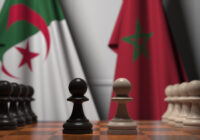In Algeria, falling energy revenue without a viable replacement risks riots in 2017.
Violent riots erupted in the northern Algerian city of Bejaia on January 2, following the introduction of the national budget set by the 2017 Finance Law on the first day of the new year. The events started with a strike by the city’s shopkeepers in protest against the law’s tax increases and reduction of key subsidies, with other members of the public joining the demonstration. The protest then descended into rioting after the crowd came into confrontation with local security forces, and clashes continued into the early hours of the morning.
Videos uploaded to social media show the police firing tear gas at protesters, and members of the crowd setting fire to a bus, a police van and various local shops. The premises of several foreign businesses—including a branch of BNP Paribas—were wrecked, while some buildings were looted. Around 100 protesters were arrested, and others hospitalized by rubber bullets fired by police.
The violence in Bejaia has been among the most disruptive protests to occur in Algeria since the 2011 riots in Algiers, which took place during the Arab Spring revolts. The incident highlights the risk for the Algerian government from altering its substantial subsidy system, which reduces the price of fuel, electricity, food and other essentials for the public. The 2017 budget also increases value added tax, income tax, property tax and tobacco tax, which Algerians have been vocal in opposing over recent months.
Labor unions have held a series of related anti-austerity demonstrations and strikes since October 2016—particularly in opposition to the government’s planned extension of the age at which employees can retire—though the events in Bejaia have been the first sign of this unrest turning into serious violence.
AUSTERITY CUTS IN ALGERIA
Like other countries in the Middle East and North Africa, Algeria’s political and economic model relies heavily on a high level of state spending to reduce the prospect of instability. In April 2016, Abdelatif Benachenhou, an ex-finance minister and former close advisor to President Abdelaziz Bouteflika, told Reuters he estimated that Algeria allocated around 22% of the country’s gross domestic product (GDP) to its system of social welfare and subsidies. This system, Benachenhou believed, was unsustainable even in times of higher state revenues, due to steady increases in the prices and volumes of materials consumed.
Over the past two years, there has been ongoing debate in Algeria about the need to alter this economic model as the government’s revenues from energy sales have plummeted. After years of oil being priced at over $100 per barrel, this dropped sharply from late 2014, resulting in a corresponding drop in Algeria’s large accumulated reserves of foreign currency. As oil remained at an average of around $50 or less throughout 2015-16, Algeria’s reserves fell from a high of over $190 billion in 2013 to $114 billion by the end of 2016.
The scale of this deficit has forced government attempts to drastically reduce public spending, which it did by 9% in 2016, followed by the current year’s reduction of 14%.
Unsurprisingly, Algeria has not been the only regional state facing a large budget deficit and dwindling currency reserves since 2014. In April 2016, the Saudi government unveiled a 15-year roadmap to reforming its economy, titled “Vision 2030,” which stemmed from the unbridgeable gap between the state’s forecast oil income and its rate of social spending until that point.
However, unlike Saudi Arabia, which has cast a restructuring toward the private sector as a positive opportunity for its nationals, Algeria has provided few concrete suggestions as to what the old, unsustainable economic order should be replaced with. Rather, the government has sharply cut public spending without focusing on a real strategy to replace it, leaving Algerians with few ideas or aspirations regarding where the reforms may lead.
This is resulting in heightened anxieties and frustration among the public, and there is a strong possibility of further violent and disruptive protests over the year ahead.
Over the past 18 months, most notable protest action in Algeria has been held in the country’s northern provinces, remote from the gas extraction sites in the southern deserts. This contrasts with early 2015, when the southern towns of In Salah and Ouargla were the locus of larger-scale demonstrations, sometimes featuring thousands of participants. While Algerian security forces will prioritize the protection of critical national infrastructure in the event of future protests, the risk remains that public frustrations will lead to further destruction of local businesses, and even hinder Algeria’s prospects for attracting highly-needed private investment.
It is notable that a BNP Paribas branch was attacked during this month’s protests in Bejaia—it is possible that other French or Western businesses will be specifically targeted if unrest persists.
 The one sector in which Algeria’s spending is being maintained is its defense budget, which will be allotted $10 billion in 2017, approximately the same as the previous year. This will be viewed with relief among domestic and international observers, who see Algeria as a relative haven of security alongside neighbors Libya and Mali, thanks to increased Algerian efforts in 2016 to militarize its borders.
The one sector in which Algeria’s spending is being maintained is its defense budget, which will be allotted $10 billion in 2017, approximately the same as the previous year. This will be viewed with relief among domestic and international observers, who see Algeria as a relative haven of security alongside neighbors Libya and Mali, thanks to increased Algerian efforts in 2016 to militarize its borders.
Algeria’s maintaining of this security beyond 2017, however, will be dependent upon its ability to sustain its exceptionally high rate of military spending, particularly given the inherent challenges of the country’s vast desert geography. If the government is not more pro-active in finding an economic infrastructure to replace high energy rents, it is possible that we will see a reduction in both security from terrorism and domestic political stability over the longer term.
The views expressed in this article are the author’s own and do not necessarily reflect Fair Observer’s editorial policy.
Photo Credit: Mtcurado
Support Fair Observer
We rely on your support for our independence, diversity and quality.
For more than 10 years, Fair Observer has been free, fair and independent. No billionaire owns us, no advertisers control us. We are a reader-supported nonprofit. Unlike many other publications, we keep our content free for readers regardless of where they live or whether they can afford to pay. We have no paywalls and no ads.
In the post-truth era of fake news, echo chambers and filter bubbles, we publish a plurality of perspectives from around the world. Anyone can publish with us, but everyone goes through a rigorous editorial process. So, you get fact-checked, well-reasoned content instead of noise.
We publish 2,500+ voices from 90+ countries. We also conduct education and training programs
on subjects ranging from digital media and journalism to writing and critical thinking. This
doesn’t come cheap. Servers, editors, trainers and web developers cost
money.
Please consider supporting us on a regular basis as a recurring donor or a
sustaining member.
Will you support FO’s journalism?
We rely on your support for our independence, diversity and quality.






